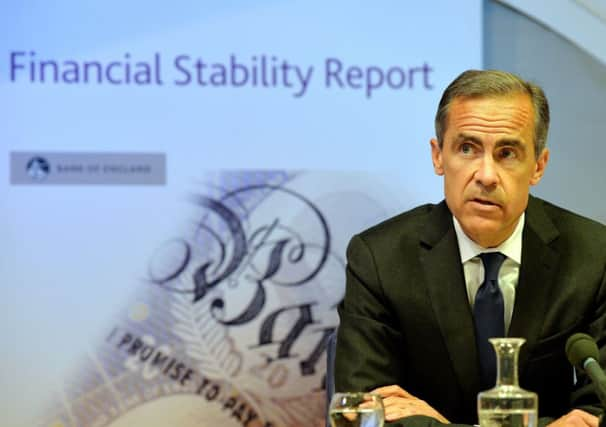Bank of England caps high-risk mortgages


The Bank’s financial policy committee (FPC) said that, with immediate effect, it would only allow mortgage lenders to have 15 per cent of their volume of new mortgages – about one in six – at multiples of 4.5 times and above a borrower’s income.
In addition, lenders will have to “stress test” loans to judge if borrowers could still afford to make repayments if interest rates were 3 percentage points higher than the rate prevailing when the loan was made.
Advertisement
Hide AdAdvertisement
Hide AdMark Carney, the governor of the Bank, stressed that the new measures would not hit the availability of mortgages, saying that if would-be borrowers “got the mortgage yesterday they could get it today”.
But he said in the Bank’s latest financial stability report that it was important any housing boom did not derail the wider UK economic recovery. “[These measures] will prevent lending getting too far ahead of income growth and they’ll prevent a slide into riskier lending and higher indebtedness that could undermine the economic expansion over the medium term,” the governor said.
Carney said the FPC did not believe the scale of household debt, with home loans normally accounting for 80 per cent of it, posed any imminent threat to the UK’s financial stability.
But he said the Bank was right to act early and “proportionately” to avoid having to take any “more drastic action later on”.
Carney added that the Bank expected the current strong momentum in the housing market, that has seen a particular spike in prices in London and the south-east of England, to continue “for the next year or so” and then slow.
Yesterday’s official intervention in the surging housing market was broadly welcomed. Andrew Tyrie MP, chairman of the cross-party Treasury select committee, said it sent out “an important signal”.
He said: “It demonstrates the Bank’s preparedness to use a financial stability tool as an insurance against the risk of overheating. It is a major departure for the UK.”
Philip Hogg, chief executive of Homes for Scotland, the homebuilding industry body, said it was pleased that the Bank had listened to calls for a targeted response “where house prices were at significantly higher multiples to income and support the principle of sustainable, responsible lending”.
Advertisement
Hide AdAdvertisement
Hide AdHogg added: “Ultimately, however, and as both the governor and the Chancellor have recognised, there is only one way to tackle pressure on house prices and that is significantly to increase the supply of new homes.”
The British Bankers Association called it a “cautious and clever” move by the Bank.
“The lending cap will have little impact on the market in the short term, but sets an important backstop to ensure indebtedness does not get out of control and pose a risk to the broader economy,” the BBA said.
The Council of Mortgage Lenders said the steps would affect lending in London, particularly, where almost 20 per cent of loans are at loan-to-income ratios above 4.5. The figure is about 10 per cent in the rest of Britain.